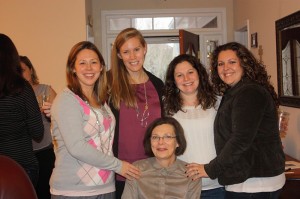June 2, 2013
 My husband and I recently had the pure joy of a week long visit from our five-year-old grandson here in Pennsylvania. We were a bit worried since he had never stayed overnight away from home. We have stayed at his house while his parents had an overnight trip. But he had not stayed with us at our home alone.
My husband and I recently had the pure joy of a week long visit from our five-year-old grandson here in Pennsylvania. We were a bit worried since he had never stayed overnight away from home. We have stayed at his house while his parents had an overnight trip. But he had not stayed with us at our home alone.
The adventure began with a plane flight. And the plane flight should have been easy peasy leaving about 8 am and arriving in State College about 4 pm. Recall the two hour time change and that makes for six hours. We had a nice layover in Detroit with plans for lunch and riding the train.
We began to get phone calls at 4 am that our flight was delayed. And delayed and delayed. We went to the airport expecting the flight to leave finally about 10:30. It did not. Mechanical problems. Most other passengers were being placed on other flights but we needed 3 seats with 2 together. Our grandson was a great sport about it all as we got to the airport and watched the flight board inch later and later. The attendants at our gate were also helpful. they provided him with first class passenger goodies. And we all got 25 dollar vouchers for food and drink.
We finally took off about 1:30. Yep. And we did not have a connecting flight now until 9:30 pm…about an hour past our grandson’s usual bedtime. Still, he remained completely enthused. Exploring everything with us in the stops along the way. Enjoying dinner. He did fall asleep on the last flight home and wasn’t too happy about being awakened to get off the plane. Still, the adventure spirit prevailed.
We went to beaches that weren’t open for swimming and parks to feed ducks. We had picnics everyday. But mostly we played in the sand, threw rocks into a frog pond, and built forts. We piled honeysuckle bushes being cut back and climbed to the top of the growing pile.
And we talked. Endlessly. If you haven’t talked with a five-year-old lately, I highly recommend it. They are so boundlessly creative. During one conversation, my grandson announced that he had powers to change me into anything I wanted to be. I said I was fine as I am, thank-you very much. He said, “No, Grammie. You have to pick something and I will change you into it.” I said, “OK, a butterfly.” “Why?” he asked. “Because I could fly and spend so much time among beautiful flowers.” “OK, Grammie” he said. “Then I am making you into a monarch butterfly. You will be beautiful and birds won’t eat you.” That’s mostly true. That monarch butterflies have an ingredient in their bodies that is mostly poisonous to most birds. How thoughtful and creative that my grandson would think of that in our conversation. I hope he can always be so thoughtful and creative. I am sure it will serve him well. A discussion of some of the research findings to support creativity’s boost to well-being can be found at this site: http://www.cnn.com/2012/05/25/health/enayati-innovation-passion-stress
 If you’ve read my book, ‘Talking about health,’ you may remember the narrative about physical therapy as an alternative to drugs and surgery. The story relates to having bone spurs in my neck. And one of the strategies I learned in physical therapy to deal with it and the pain they cause–support the neck. Always. So elbows on the table–not rude, pain-saving. Elbows on arm rests in the car, on the plane, any and everywhere–pain-saving. Even here, as we wait to launch our kayaks. There you see it. Elbows on my hips. And where did these bone spurs come from, you might ask. Too much time leaning into the computer without a break. Yes, the 21st century technology has its own ‘factory-worker’ like syndrome. Try to avoid it with frequent breaks and moving your neck around. If it’s too late, support your neck, lift it off the painful spot and give yourself support to relieve the pain…
If you’ve read my book, ‘Talking about health,’ you may remember the narrative about physical therapy as an alternative to drugs and surgery. The story relates to having bone spurs in my neck. And one of the strategies I learned in physical therapy to deal with it and the pain they cause–support the neck. Always. So elbows on the table–not rude, pain-saving. Elbows on arm rests in the car, on the plane, any and everywhere–pain-saving. Even here, as we wait to launch our kayaks. There you see it. Elbows on my hips. And where did these bone spurs come from, you might ask. Too much time leaning into the computer without a break. Yes, the 21st century technology has its own ‘factory-worker’ like syndrome. Try to avoid it with frequent breaks and moving your neck around. If it’s too late, support your neck, lift it off the painful spot and give yourself support to relieve the pain…










